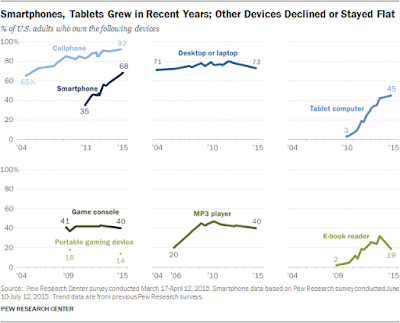So, the Pew Research Center has some new data for digital device adoption, and the numbers are looking distinctly meh for consoles. Meanwhile, smartphones and tablets continue to skyrocket in popularity. It's something that has been getting more and more frequently discussed, whether consoles in the middle of a terminal decline. This new set of data in the very least suggests that consoles are stagnating in terms of industry wide sales in the US.
The data shows console sales from 2009 to 2015. If one looks at around the time when the latest batch of systems came out, there's barely an upward tick to be seen, even with all of the hoopla about how well the PS4 has sold. Moreover, the percentage of people in the US who own a console has stayed consistent at about 40% while smartphones and tablets have enjoyed rapid increases in ownership.
It's been said many times before, but this survey continues to suggest that we're seeing a generational shift where it's adults in their 20s and 30s who are carrying the console market, while younger people are exhibiting less interest in it, instead gravitating toward mobile platforms.
For now, console adoption seems to have leveled off, but it remains to be seen if adults will continue to invest in such systems indefinitely. Should we see their interest taper off, it stands to reason that mobile will overtake consoles all that much quicker. Then the question will be where developers will focus their attention most.
This could also be impacted as mobile technology continues to advance. While some people will claim that smartphone games are dumbed down cash grabs (and many of them certainly are), I can't help but wonder if they'll just increasingly docked devices at home. Carry the thing around like a phone during the day doing basic activities in a game, then place it in a dock connected to the TV when at home, using a controller of some sort for more involved aspects of the same game. It's a a logical way of approaching mobile gaming in the future, but whether or not developers will pursue it remains to be seen.
As I've said before, mobile gaming is still in its infancy, and has a very long way to go. I don't really see what I suggested happening for at least another decade in any meaningful, widespread fashion for at least another decade. At that point, it seems far more likely that these young people that are helping tablet and smartphone adoption grow so much will be out of college, still interested in games, but want to evolve mobile gaming far beyond what it is now.

